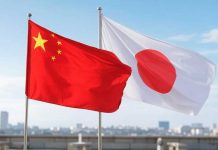DM Monitoring
LHASA: China held a grand gathering to celebrate the 70th anniversary of the peaceful liberation of Tibet.
More than 20,000 people from various ethnic groups attended the event held in Lhasa, capital of the Tibet Autonomous Region.
President Xi Jinping, general secretary of the Communist Party of China (CPC) Central Committee and chairman of the Central Military Commission, wrote inscriptions “building a beautiful and happy Tibet and together fulfilling the great dream of national rejuvenation” on congratulatory plaques presented at the event.
The national flag of the People’s Republic of China was raised at the beginning of the celebration. People sang the national anthem.
A congratulatory message from the CPC Central Committee, the Standing Committee of the National People’s Congress, the State Council, the National Committee of the Chinese People’s Political Consultative Conference (CPPCC) and the Central Military Commission was read.
Wang Yang, a member of the Standing Committee of the Political Bureau of the CPC Central Committee and chairman of the CPPCC National Committee, attended the gathering and presented congratulatory plaques and banners.
Wang also addressed the event.
Wang, who is leading a central delegation to Tibet, said the delegation is entrusted by the CPC Central Committee and Xi to jointly celebrate the 70th anniversary of Tibet’s peaceful liberation with people of all ethnic groups in Tibet.
Wang called the peaceful liberation of Tibet in 1951 “a major victory in the cause of liberation of the Chinese people and China’s reunification,” saying it marked a historic transition with epoch-making significance for Tibet.
“Since then, Tibet has embarked on a path from darkness to brightness, from backwardness to progress, from poverty to prosperity, from autocracy to democracy, and from closeness to openness,” Wang said. “A thriving socialist new Tibet is standing tall and firm at the rooftop of the world.”
In the old Tibet, the reactionary and barbarous feudal serfdom was practiced.
With the establishment of socialist system and regional ethnic autonomy, the rights of people of all ethnic groups in Tibet to equal participation in the governance of state affairs and to administration of affairs of the autonomous region are fully ensured.
At present, Tibet has over 35,000 deputies of people’s congresses and over 8,000 CPPCC members at various levels, 90 percent of whom are ethnic minorities, Wang said.
In the old days, agriculture and livestock in Tibet were at the mercy of nature; industry was non-existent; and a round trip between Xining and Lhasa would take more than six months.
The GDP in Tibet soared past 190 billion yuan (about 29.3 billion U.S. dollars) in 2020 from merely 130 million yuan in 1951, Wang noted. During the 13th Five-Year Plan period (2016-2020), Tibet hosted close to 160 million tourist visits.
Now 140 flights connect Tibet with the rest of the country and the world.
In the old Tibet, over 90 percent of Tibetans struggled for subsistence, and up to 95 percent were illiterate. Today, hunger and poverty is a thing of the past for people of all ethnic groups in Tibet, and per capita living space in Tibet is close to 40 square meters.





